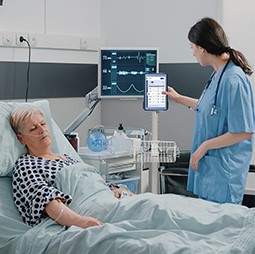By First Products on 9/13/23 7:30 AM
In recent years, the synergy between Artificial Intelligence (AI) and mobile technologies has been fostering a new era of innovation in healthcare. As mobile devices become more sophisticated, their potential to support healthcare professionals in predicting and managing patient outcomes is reaching remarkable new heights. This alliance is particularly noteworthy in the realm of predictive analysis, where timely insights can significantly enhance patient care.
The advent of mobile technologies equipped with AI capabilities has paved the way for real-time data collection and analysis. Healthcare providers can now tap into a wealth of data generated from wearable devices, mobile applications, and remote monitoring systems. This data, when analyzed through the lens of AI, can yield predictive insights that are crucial for early intervention and personalized care.
One of the primary benefits of mobile AI in healthcare is its ability to provide instant access to vital information. Physicians can receive real-time updates on a patient's condition, irrespective of their location. This immediacy not only facilitates swift decision-making but also ensures that the requisite care is delivered without any undue delay.
Moreover, the predictive analysis enabled by mobile AI can be a game-changer in chronic disease management. By analyzing historical and real-time data, AI algorithms can predict potential flare-ups or complications, allowing for preemptive measures to be taken. This is particularly beneficial in managing conditions like diabetes, heart disease, and chronic respiratory issues, where timely interventions can significantly improve the quality of life.
Besides individual patient care, mobile AI has a transformative impact on public health initiatives. Predictive analysis can help in identifying potential outbreaks of infectious diseases, thereby enabling timely containment measures. Moreover, by analyzing population health data, healthcare authorities can design better-informed policies and intervention strategies.

Furthermore, mobile AI facilitates a more personalized healthcare experience. By analyzing an individual’s health data over time, AI can help in tailoring treatment plans that are uniquely suited to each patient’s needs and circumstances. This personalized approach not only enhances the effectiveness of the treatment but also empowers patients to take a more active role in managing their health.
The potential of mobile AI in healthcare is vast, yet its implementation comes with a set of challenges. Data privacy and security are paramount concerns, requiring robust measures to ensure that sensitive health information is handled with the utmost integrity. Additionally, the accuracy and reliability of AI predictions are contingent on the quality and comprehensiveness of the data, necessitating stringent data governance and validation protocols.
As we navigate through the digital transformation in healthcare, the alliance of mobile technologies and AI holds a promise of a more responsive, personalized, and effective healthcare system. The journey towards harnessing the full potential of mobile AI in healthcare is an ongoing one, filled with opportunities for innovation and improvement. By embracing the power of mobile AI and predictive analysis, healthcare providers are not only enhancing patient outcomes but also paving the way for a healthcare ecosystem that is more adaptable, efficient, and patient-centric.
_11wX8.5h-FINAL.png?width=721&name=FP-Logo-Horizontal-(COLOR)_11wX8.5h-FINAL.png)



comments